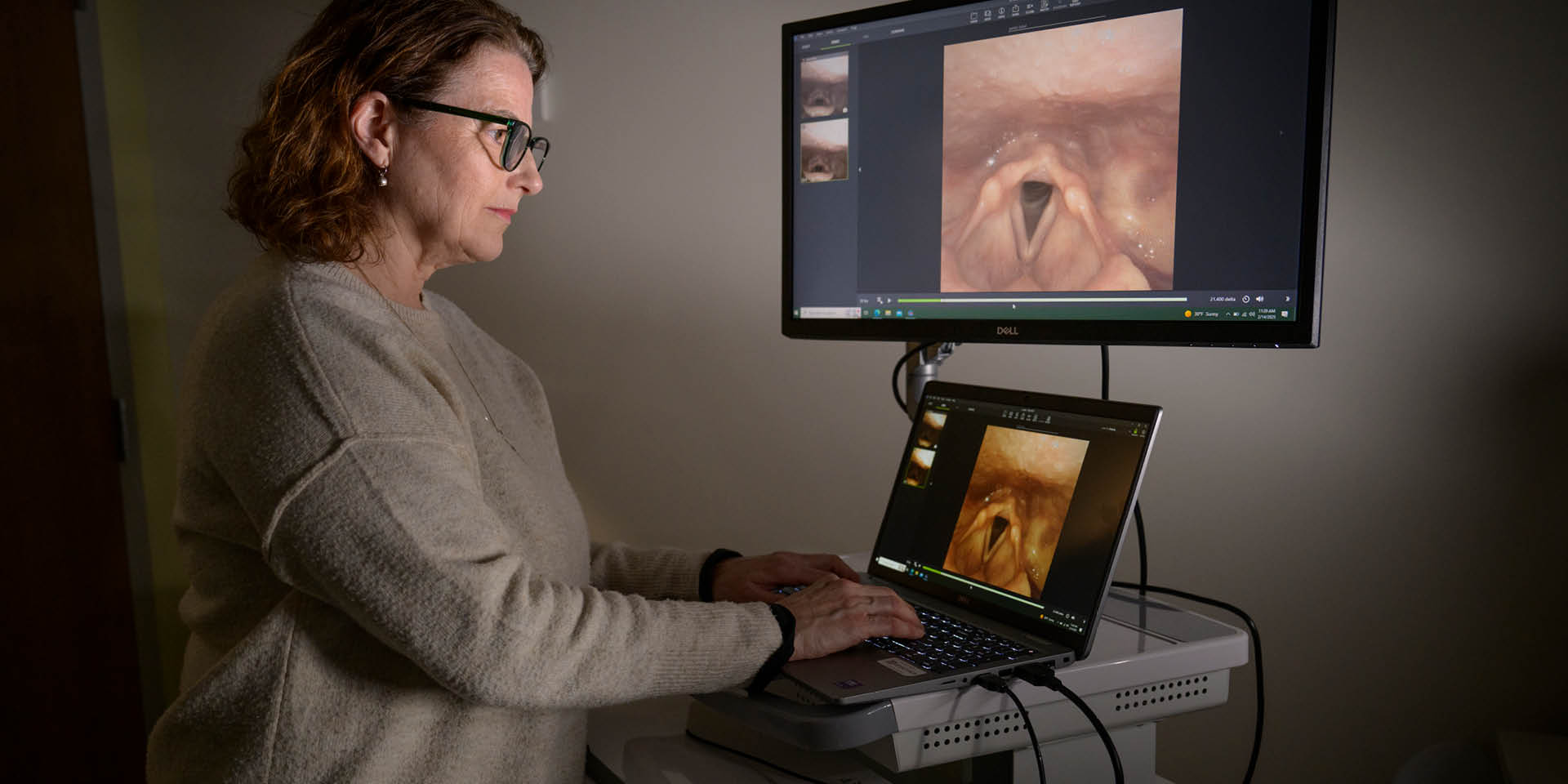Beth Burn, Speech Therapy Supervisor at Penn Medicine Doylestown Health, demonstrates new equipment used for Flexible Endoscopic Evaluation of Swallowing (FEES). The new, portable equipment provides speech-language pathologists a clear, close-up view of the throat and airway during a swallowing assessment.
In a hospital, one of the main roles of speech-language pathologists (SLPs) is to assess swallowing function.
“If someone cannot swallow properly, they are at risk for aspiration when a portion of the food or drink they swallow is inhaled into their lungs,” says Beth Burn, MS, CCC-SLP, Speech Therapy Supervisor at Penn Medicine Doylestown Health.
Swallowing assessments help to determine a patient’s risk and prevent related complications such as aspiration pneumonia, a bacterial lung infection that can lead to serious health issues and longer hospital stays, according to Beth.
Precise, portable, patient-friendly FEES
Thanks to a generous donor contribution, Penn Medicine Doylestown Health recently acquired equipment, including two flexible endoscopes, a mobile cart, and recording software needed to complete Flexible Endoscopic Evaluation of Swallowing (FEES). This portable tool provides speech-language pathologists a clear, close-up look at the throat and airway while the patient swallows.
People with neurological conditions, such as stroke, Parkinson's disease, deconditioning, head and neck cancers, and advanced dementia are more likely to have swallowing difficulties, according to Beth.
“Before conducting a study, we perform a bedside assessment to gauge a patient's risk. If needed, the next step is an objective assessment such as FEES or a modified barium swallow study (MBSS) exam,” says Beth noting that a physician’s order is required for these studies.
While both studies objectively assess swallowing, FEES can be performed at the patient’s bedside and does not use x-rays, so there is no exposure to radiation.
In contrast, the MBSS relies on X-ray technology to capture images of the swallowing process and patients must be transported to Radiology. The food and liquids are coated with a barium solution, which helps the X-ray to show detail. The number of images and duration of the study is limited to minimize radiation exposure, thereby reducing the chance of capturing an aspiration event, according to Beth.
Penn Medicine Doylestown Health is also offering FEES on an outpatient basis both at the main hospital and the Clark Outpatient Rehabilitation Center on the Doylestown Hospital campus. A physician’s order is required.
Understanding FEES
"FEES helps us to see whether food or liquid is going into the airway, causing aspiration, or getting stuck in the throat, which can cause choking,” says Beth. “We are able to observe swallowing in real time, and assess how well a patient protects their airway while swallowing food and liquids."
Taking the test to the patient
A compact, rolling cart holds everything needed to perform the study--a laptop, camera scope, and special food dyes to make the food and liquids more visible. “This setup is particularly beneficial for patients who can't be easily moved, such as Intensive Care, where people are connected to complex monitoring equipment." Beth says.
A clear, real-time view
To perform the study, the speech-language pathologist inserts a flexible scope with a tiny camera through the nose to observe the throat from above the tongue.
“The fiber optic camera provides a high-resolution, close up look at the throat and airway structures in real time not only as the patient swallows, but also during normal breathing, coughing and speech tasks. This provides additional information helpful in assessing a patient’s risk for aspiration,” says Beth.
The FEES endoscope uses new chip on tip technology that delivers high definition resolution, and the software allows for unlimited recording of images and videos. Patients consume real food and liquids, which may be treated with edible dyes for improved visualization.
Elevating care in our community
"We are grateful to Chris and Mary Jane Beck for their support, which enabled us to acquire the FEES system,” says Beth. The Beck’s kindness and generosity has helped in many ways from rebuilding Children’s Village to the purchase of new technology for the VIA Maternity Center.
About Penn Medicine Doylestown Health
Penn Medicine Doylestown Health is a comprehensive healthcare system of inpatient, outpatient, and wellness education services connected to meet the health needs of the local and regional community. The flagship of Penn Medicine Doylestown Health is Doylestown Hospital, a 245-bed not-for-profit, community teaching hospital with a medical staff of more than 600 providers who deliver the highest quality care in over 50 specialties. Renowned locally, regionally, and nationally, Doylestown Hospital provides superior healthcare and offers advanced surgical procedures, innovative medical treatments, and comprehensive specialty services. Serving Bucks County for over 100 years, Doylestown Hospital is proud to educate and train the next generation of physicians through its family medicine residency program.
About Clark Outpatient Rehabilitation Center
Located in the Ambulatory Center on the campus of Doylestown Hospital, Doylestown Health's spacious new Clark Outpatient Rehabilitation Center provides a convenient one-stop option for multidisciplinary outpatient therapy. Seamlessly connecting consultation, diagnosis, intervention and treatment services with physical therapy, occupational, hand and speech therapy, the Clark Outpatient Rehabilitation Center is staffed by licensed therapists only.
